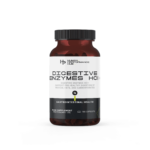Glycine is a naturally occurring amino acid that the body uses to create proteins. This is needed for the growth and maintenance of tissue, for the production of hormones and enzymes and for a number of other health benefits. In this article, we discuss the top 7 benefits of glycine to help you understand why supplementing with glycine can be so valuable.
So, what are the top 7 glycine benefits? Glycine is an amino acid that contributes to a number of health benefits including the production of serotonin and glutathione, improving sleep, supporting athletic performance, reducing the risk of heart disease and more.
Read on to learn more about what glycine is, what it does and how much should be taken per day to receive the benefits.
What is Glycine and What Does it Do?
Glycine is an amino acid that naturally occurs in the body. It can also be consumed in food such as meat, fish, dairy, legumes, or as a supplement. It is a building block for making proteins in the body and is involved in transmitting chemical signals to the brain, as well as stimulating the production of serotonin, the “feel-good hormone”.
Further to this, glycine is also a key component of collagen, the protein that gives structure to the bones, skin, muscles and connective tissues. Other benefits and uses for glycine (in which we will go into more detail later) include:
- Mood and memory
- Sleep
- Needed to produce an antioxidant
- Improves brain-muscle performance
- Decreases the risk of heart disease
- Protects the liver from alcohol damage
- Aids in the management and prevention of diabetes
Top 7 Benefits of Glycine
Below we go into more detail about the top 7 glycine benefits.
Powerful Antioxidant
Glycine is one of three amino acids that the body uses to create glutathione, a powerful natural antioxidant. Glutathione protects the cells against oxidative damage caused by free radicals (thought to underlie many diseases).
If the body doesn’t naturally produce enough glycine (or other amino acids), less glutathione will be produced. This may negatively impact how the body handles oxidative stress. Over time, the body begins to produce less glutathione, therefore, it’s important to supplement glycine levels with diet or supplements.
Decreases Risk of Heart Disease
As a powerful antioxidant and anti-inflammatory, glycine may help to reduce the risk of heart disease. In fact, a study in the Journal of the American Heart Association found that those with a higher plasma glycine level had a reduced risk of heart attack and had a more favourable heart disease profile.
Improves Brain-Muscle Performance
Glycine plays a part in the creation of creatine, a substance that provides muscles with the energy needed for short bursts of strength and speed. It is a particularly popular benefit for athletes.
It can also provide the brain with energy which can help with cognitive functions such as short-term memory and reasoning.
May Improve Sleep Quality
Amino acids like glycine are thought to have a calming effect on the brain and may help people to fall asleep easier. It may also help people to stay asleep by lowering their core body temperature.
Further to this, research has shown that glycine can help to lessen daytime sleepiness and improve cognition.
Aids in Diabetes Management and Prevention
It is thought that glycine may aid in the management and prevention of diabetes as glycine stimulates a gut hormone that increases the ability of insulin to remove glucose from the bloodstream.
Protects the Liver from Alcohol Damage
Whilst there are a number of health benefits to reducing alcohol intake, glycine has been shown to reduce the harmful effects of alcohol on the liver by preventing inflammation.
It may also reduce concentrations of alcohol in the blood by stimulating the metabolism of alcohol in the stomach, rather than in the liver which may prevent the development of fatty liver and alcohol cirrhosis.
Further to this, glycine may also aid in the reversal of liver damage and improve the recovery process. In a study, liver cell health returned to baseline 30% faster in those supplemented with glycine than those without. That being said, more research is needed in this area.
Impacts Mood and Memory
Glycine stimulates the production of serotonin, the “feel-good” hormone that helps to improve mood, memory and cognitive thinking. In fact, some people refer to glycine as a “natural antidepressant”. However, it’s important to note that these benefits are typically short-lived.
How Much Glycine Should You Take Per Day?
We recommend starting with 1 scoop of glycine powder mixed with a bit of water and taken after your evening meal. This dosage can be increased to a maximum of 30g if you do not see any benefit from a single scoop, but be sure to monitor the effects and response you get from the supplement. Talk to a qualified practitioner if you need further specific advice for your health.
Glycine Powder at Human Performance Hub
At Human Performance Hub, we offer our own Glycine Powder supplement to help improve your performance, encourage better sleep, boost your mood and assist with a number of other health benefits. Take a look at our range online today, or get in touch with us for tailored advice.



